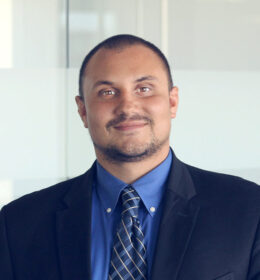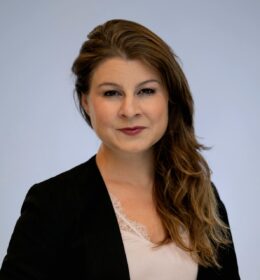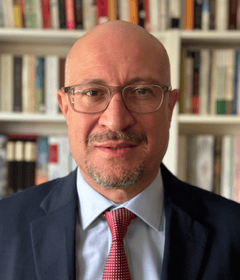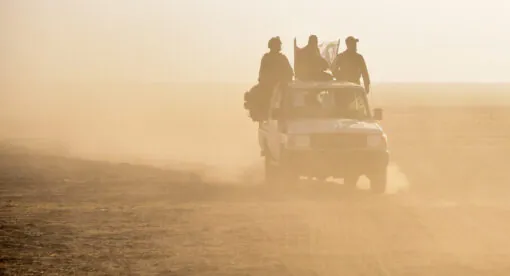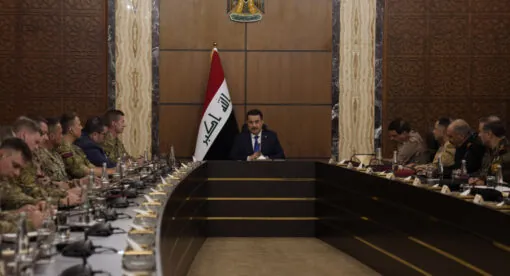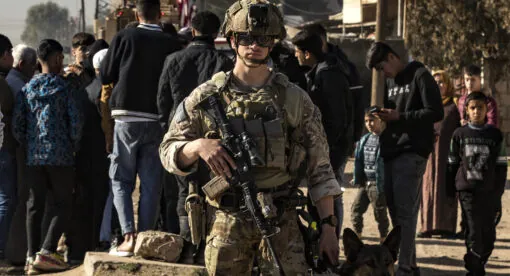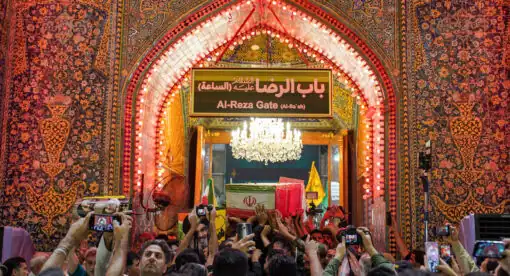In this inaugural edition of The New Lines Institute Middle East Center’s Post-Assad Podcast series, Middle East Center co-director Nicholas A. Heras sits down with the Center’s Resident Senior Fellow Murad Batal Al Shishani and the Institute’s Priority Sustainable Counterterrorism Portfolio head and Senior Analyst Tammy Palacios to discuss the prospects for stability in post-Assad Syria. These two institutional experts on global Salafist-Jihadist movements and the Syrian conflict assess the likelihood that former Al Qaeda affiliate Hay’at Tahrir Al Sham will be able to turn its shocking military victory over the former Assad regime into a sustainable and inclusive governance system in Syria.
Nicholas Heras:
Hello, my name is Nick Heras, and I’m the co-director of the Middle East Center at the New Lines Institute for Strategy and Policy. I will be your host for today’s conversation on the Syrian armed group Hay’at Tahrir al-Sham, or HTS, and the prospects for it to transform into the foundation of a future government, post-Assad Syria. Joining me for this conversation are two of our outstanding analysts, Murad Batal Al Shishani, and Tammy Palacios. Murad is a senior resident fellow at the Middle East Center, here at the New Lines Institute. He is a world-renowned scholar on violent, non-state actor movements in the Middle East, with especially profound expertise on South East jihadist organizations, both in the region, and globally.
Murad is the author of several books about Salafi-jihadist organizations, and he worked for many years at the BBC as an investigative correspondent and analyst. Tammy is a senior analyst at the New Lines Institute, who is the portfolio head of the Priority Sustainable Counterterrorism portfolio. She has authored several analyses on HTS, including on its strategy, and building community support, and to run governance in Syria. Welcome Murad and Tammy. Thank you for joining me for this discussion. Murad, I wanted to turn to you first and ask, what is Tahrir al-Sham, and what is its approach to governance?
Murad Batal Al Shishani:
Hay’at Tahrir al-Sham represents an earthquake, a tsunami in the Middle East these days. It’s showing us a jihadist group transforming into a government-leading group, in a sense, turning to a group that wants to build a state, after defeating or toppling down dictatorship. That’s very interesting dynamic in the Middle East, if you put it that way, in the top of that as a headline. Hay’at Tahrir al-Sham started as an offshoot of Al-Qaeda, a jihadist group back in 2011, late 2011, under the name of Jabhat al-Nusrah, and it was its leader is now the guy we’ve seeing all over the news, Abu Mohammed al-Julani. Now he’s introduced by his original name, Ahmed al-Sharaa, who’s maybe the de facto leader for today’s Syria in a sense. Back in 2011, this guy Ahmed al-Sharaa or Abu Mohammed al-Julani was a jihadist in Iraq and he asked a permission and he got a proposal after the revolution as the opposition call it in Syria.
When started, he got this proposal in the hand of his master or his boss was Abu Bakr Baghdadi, the leader of the so-called Islamic State. At that time they call it Islamic State in Iraq. So he put this proposal and he moved to Syria. He formed this group called Jabhat al-Nusrah. However, just few months after that he fall out with his old paymasters. Then he formed his own group and paid allegiances, formal allegiances to Al-Qaeda. Since then, he went through different phases until the opposition started to gather in Idlib in the northern Syria. Since then, he formed a so-called the Al-Qaeda government, the rescue government if you like, and since then he started to rely on the local councils, which divide based on the ethnic tribal divisions in that region. Also, he started to run through this government, the education and the health systems and with a very strong security apparatus.
Therefore, he went into huge confrontations with a so-called Islamic State. He went in confrontation with other militant factions inside Syria and he became a de facto ruler to that area in a sense, so that if I can summarize the way he ruled Idlib, but now he’s presenting or rebranding himself in a more modern way, if you like. I’m calling that he wants to have a normal relations with the neighbors, with the regional power, international powers, and also he’s just sending messages inside. He let the prime minister, the regime prime minister to run day-to-day the government until they appoint their own and he was trying to use to play around the stereotypes as they put it, about them being just a jihadist. But he presenting himself now as a statesman or a leader of a state in this sense.
Nicholas Heras:
Thank you Murad very much. Tammy, I want to get your perspective on this question on Hay’at Tahrir al-Sham’s approach to governance. You’ve looked deeply at HTS in Idlib, and how do you think it will develop its strategy now that sits as a potential kingmaker in Damascus?
Tammy Palacios:
Thanks, Nick. I appreciate this question and I think that while colleague Murad here actually did a really good job of the macro impact and assessment of HTS through its history, how it got here and the impact, the waves that this event will have on the Middle East, I think it’s also helpful to have a bottom-up approach. And in my opinion, the best way to assess how HTS may approach governance at the national level as we’ve seen some of its first movements with police and administrative delegations, is actually to examine the style and the organizational structure and delivery of HTS’s shadow government, the Syrian Salvation government. That’s something that we have a really good track record of. We were able to see the 10 ministries govern in Idlib governate and the iterations, the waves if you will, of how HTS and Julani responded to tensions within the group, with other groups in the ecosystem.
So with Hurras al-Din, Turkistan Islamic party as well as ISIS representation in that region, but also at the local level, how they engaged with IDP camps, how they engaged with NGOs, both local but also Turkish-backed, and then also their iterations of how they engage with Turkish-backed entities. And I think looking back at the history, I’m thinking specifically of around June 2020 where HTS was pursuing a wave of arrests, some foreign nationals, so arrests of Tauqir Sharif who was a British aid worker who had been working in Idlib since 2013, and then also Bilal Abdul Kareem, and a number of other NGO human rights-related workers over the years. And that was just a wave of control arrests. They were quiet until the internet took them and spread it like wildfire. But I expect that that kind of wave of control, whether it be in arrests or another, perhaps more legal ways as they now pursue control over a national government, that might be something that we could see in the future if they were to experience pushback by any entity.
Nicholas Heras:
Thank you, Tammy. So Murad and Tammy, this is very interesting because we see in a lot of ways with HTS the sort of, to take a term from Fawaz Gerges, the famed scholar on southeast jihadist groups, you see with HTS a journey of the jihadists in that they originated as essentially a vanguard of ISIS and then evolved to become this organization that in a lot of ways represents what many theorists on the southeast jihadist movement assessed would be the next evolution, which is transition from a vanguard into a governance structure that in a lot of ways shapes the local, socio-cultural, socio-political and organs of power of communities, regions, and potentially states.
So I wanted to ask, because this is a major question now, which is we’re in the early period after the fall of the Assad regime, you have a significant number of armed opposition factions in Syria. And not all these armed opposition factions are in love with HTS. They may honor HTS’s role in the downfall of the Assad regime, but they’re distrustful of HTS. And I wanted to ask both of you starting with Murad, how would you characterize the relationship of HTS with the other Syrian armed opposition factions? And here’s specifically referencing groups that are potentially Islamist in backgrounds or maybe more secular in outlook, but are willing to engage with a Islamic government in Damascus?
Murad Batal Al Shishani:
I would say one word, domination. I think HTS wants to dominate other groups by all means, I would say. Yeah, they went into confrontation with the so-called Islamic State, then they left Al-Qaeda and they formed their own group, which localized it. We need to remember usually the jihadist groups, since they started to emerge in early 1980s, they have this binary decision or the dectomy between are we localized jihadi group or we are global jihad. Are we just better to control a land and establish caliphate or rely on vanguards that will, or elites if you like, that will be forming that promised jihadist enclave or whatever? So these discussions always give a good paradigm or an umbrella to understand how al-Julani or what has al-Julani achieved now. He achieved a sort of a breakthrough, I would say. He’s the first jihadi, even he transformed as he saying, he achieved to defeating what the jihadist, the literature says the near enemy for the first time in many years or even in the history of the contemporary jihadist movements.
So therefore I’m not really taking too long time thinking of the about is he became a moderate Islamist instead of jihadist or not? Is it a PR stunt or not? But I’m worried about, as Tammy mentioned, that how he will be reacting, interacting to the other groups with other groups in Syria. And this will require of him expanding the governance and forming a new government, etc. But his relation with other groups will be based on domination, because he thinks that he is the owner of this victory in this sense. There are other groups which link in a way or another with regional powers, mainly Türkiye for instance, that’s whether it was Islamist groups or “secular.” But these groups have been weakened through all these 13 years of the Syrian revolution. So Julani has built up his power so he can stay dominant on this. So then the question will be how other, let’s say regional and local, willing to interact with him, willing to share power with him and to what extent he’s willing to share the powers he is gaining day after day.
Nicholas Heras:
Tammy, I want to build off what Murad just said because I think it’s a very interesting dynamic here where you have almost an evolved, if you will, form of Salafi-jihadism represented by HTS. Do you feel that this evolved form of Salafi-jihadist organization can actually create a stable governance structure over all of Syria? So from Damascus that HTS working through partners can essentially create a system that maintains that sort of jihadi sense of asabiyah, if you will, but is flexible enough and dynamic enough to address the challenges of post-Assad Syria while also maintaining strong hold on all the levers of power?
Tammy Palacios:
Thank you, Nick. It’s really interesting and I think we have to break this into almost three groups or three levels. I think that Julani’s aspirations and the objectives of HTS as exhibited via Syrian Salvation government, this de facto government that’s been in control of local governance in Idlib for a handful of years now, it only tells us so much and it only goes so far. There is a history of rifts and dynamics and struggles between ecosystems that we see with every single al-Qaeda ISIS affiliate around the world. At some point, I think Julani, as Murad mentioned, that key word of dominance, I think that really is a good way to think about this question. But I wonder if Julani actually prepared enough for the scale up because we have the question of if Julani HTS can effectively and in a stable way govern Syria.
That’s one question, but I wonder if he has prepared to dominate and control and have complete and lasting control over all members within HTS and that ecosystem. He’s done his homework and he’s certainly put some of the work in. I look now at the alleged cooperation with the U.S. and coalition forces to pick off some of those more hardline leaders. So Hurras al-Din, especially leadership, and those that are more hardline in ideology, those have been picked off in target kill strikes for the past couple of years. That was no accident, I think. He was preparing the ecosystem to be friendly for this control and him being, because if you have elements of your membership that have other groups that they can go and join who are maybe medium control, that would question his ability to maintain control over HTS and all of its members.
So that’s where I think about that. I see also just in terms of how HTS cooperates with other Syrian armed groups, they’ve really been almost a protector of and a partner to TIP. So that will be interesting to see if maybe some of those leadership elements in Afghanistan or elsewhere in the world may return to Syria. That’s something I would watch, but I’m curious almost to pass this back over to Murad, what he thinks about that.
Murad Batal Al Shishani:
Oh yeah, you raised a very, very interesting comments here, remarks here, Tammy, and thank you for this. And mentioning Huras al-Din, that’s really reminded me of his policy towards them. I remember that checkpoint in Idlib 105 was a good source of money for all these lorries coming and carrying goods from Türkiye. And I remember at that time, 2018, 2019, he gave that checkpoint to them, to Huras al-Din, and the money was generated from them, but they didn’t have enough of it, so they want more. But to give our audience a little background, Huras al-Din was considered the al-Qaeda wing inside HTS and in that sense, and then he started to crack on them in a very strong feast. So that was I think is a inner house arrangement or organizing his inner house in a sense of avoiding any troubles in the future, which is it CMCP done successfully so far.
However, you raised another very interesting point about his collaboration or suspecting being collaborating with the States, with the Americans and other foreign powers. We know his love-hate relation with Türkiye, but with Americans especially al-Baghdadi was killed in his area of influence. And that raised huge debates among jihadi sympathizers where he was just collaborating. He has hands in it, etcetera. And then there is also a very interesting point linked to the relations with the others. There is now when he was trying to organize his inner house and crack on extreme elements, if we can say it that way, but that was just very limited into Idlib and in a small enclave area. Now we are talking about a country, bigger state. You have the Kurds in the north, they having a problem with Turks as well as he needs to forge deals with them.
We’ve seen them, they’re fighting now, they’re moving to east Euphrates, the Kurdish forces. You have very strong militants in the south in Daraa as well, which he has no influence in the recent years over them as he did with the others in the north. So these questions would really put him in a position that he needs to think of how would he react with these groups? And you’re right, absolutely, these things will be a major question how we are, but I’m really, really very glad you mentioned that the returnees from different five, because these people based on kind, they keep the relations, the jihadists, they keep the relations.
There may be people change and they transform this group or rebrand it, however, they have other influences who might be coming back because they feel that it’s their duty. And from the prisons, we know that after releasing all these prisoners, there will be some people, elements if you like, and some individuals who’ve been influential jihadis. And these guys also, he will need to deal with them. Although yeah, dominance will be the keyword this time as well because he want to maintain the power. I think Julani will be aiming to become an individual leader in this country, kind of authoritarian style.
Tammy Palacios:
What an excellent point on how he’s maintained relationships. And I think that’s just a really good way of at the operational level, seeing the outcome of his pragmatism and the group’s pragmatism over the course of the years. I am still a realist, but an optimist. And so I would hope to see that Julani in the coming days, weeks, months, will decide to choose the Syrian people and a successful prosperous and peaceful Syria for all parties. And I think that that will require him making a clear movement away from some of those relationships with Al-Qaeda-connected entities that has allowed for his survival in Idlib for the last few years. But in the long term, I think that that will be necessary and that may even look like Julani for example, having to maybe deal with members within HTS that pursue more hardline ideologies if they pop up in the future.
Nicholas Heras:
So I want to come in here because I think it’s very interesting when we look again, it’s been essentially a week as of the recording of this discussion, but we can expect that it will be a lengthy process of sorting out how the future contours of the Syrian state are constructed essentially. And when you watch the narrative around Ahmed al-Sharaa and the mystique, there’s been a lot of comparison in some ways to almost a Salafi-jihadist Che Guevara. I’ve seen that commentary been made, but probably even more important, and I think more tied to the local dynamic in Syria is just the outpouring of emotion that I see from people, Syrians, when they see the Umayyad Mosque in Damascus under the control of the opposition. It’s just hugely symbolic site. So important to the history of Islam, so important to the history of Islam as it spread from the Arabian Peninsula, modern-day Syria.
And they’ve been very effective, the people around HTS of portraying these images, if you will, this divine victory, and I’ve seen that in the narrative. I’ve seen that narrative of the Syrians involved, but also these foreign elements, foreign fighters such as the Uyghurs, the Uzbeks, others. You mentioned for example TIP, Tammy, as one example of that to extend Islamic party. And so this halo effect that Ahmed al-Sharaa can just tap into seems very important to his ability in this day and age where narrative matters so much and people are people wherever you are in the world, there’s a certain common human interconnectedness and narratives in zeitgeist matter. And this idea that the zeitgeist of a divine victory does that provide HTS with enough of a halo effect to be able to assert themselves and develop some of these potentially authoritarian structures that you both seemed concerned about. And I want to ask Tammy first your perspective on that.
Tammy Palacios:
Yes, and I think that choice it brings about concern. He chose to host that speech and to have that image be one of the first moments of his leadership, and he could have picked a secular location and he didn’t. And that messaging, the messaging that the difference between the messaging there to the Syrian people and it having that divine framing versus his framing to the west in the interviews that he’s provided in the past couple of years, but also just the statements that he made or HTS personnel made to Iraq for example, and to the entities that were located in Aleppo, the foreign diplomats and the assurances that he made to them, and then also the Kurdish people and how HTS would protect them, we’re just hearing a lot of different narratives.
And that’s something that I think it’s concerning and HTS and Julani has proven yes to be pragmatic, yes to have rebranded into supposedly this moderate and governance-focused entity, but it brings about concern because he is over and over again, time and time again proven to be yes, driven by survivalist instincts and dominance of the ecosystem of the areas of HTS having the upper hand with other groups, but also it has this air of opportunism and the loyalty and the relationship and whatever the primary identifier is has changed.
And so the U.S. and other western allies, international community, we are taken by the idea that this has been a movement towards more democratic-style governance or human rights and away from Al-Qaeda and this Salafi-jihadist foundation. But how much of that is us just really hoping that that is true? And I think we have no way to really know. We just have to watch what Julani does moving forward. But also at this point, it’s very important that the U.S. and the international community that is hoping that that is the eventual outcome of this. That is what Syria ends up looking like, that we have to make those wants and those desires clear right now. We can’t just sit back on our haunches and wait and see what happens. I think that there is a huge need for the U.S., especially to make clear that we need to see a clear formal disavowal of those Al-Qaeda roots and also just extremism jihadism, not just right now in this week, but in the year and the years to come.
Nicholas Heras:
I want to pivot off of what Tammy just said, and Tammy took us into this major question of how the U.S. should approach HTS, and I’ve started to see a little bit of chatter that perhaps in some ways Ahmed al-Sharaa is like a modern-day Saladin and that the United States shouldn’t get in the way of that, but instead should find ways to engage with that element that has now inserted itself into the region. And you try to find a way to engage with that to broker long-term stability and hopefully a better system than has been before. How do you think the U.S. should approach him and his organization?
Murad Batal Al Shishani:
Nick, I’ll put few points answering or commenting on some of the excellent remarks from Tammy and answering how U.S. should approach such situation. To start with Julani al-Sharaa, yes, he is a pragmatic opportunist in a sense. He’s a political creature in a sense. So we take it from there. And also since post-9/11, we tend to forget that there is some elements of Islamist conservatism, I’m not talking jihadist ideology now, has acceptance and has audience in the Middle East and in Islamic world that’s coming from their own culture. So the transformation of Julani, that wouldn’t make him just a democratic secular person. That means he’s giving thought of his own ideology and modifying it. Yeah, there is a opportunist element in it when for instance, you mentioned the foreign fighters as he did with the Chechens, after the Chechens who’ve been fighting in Latakia, he imprisoned few of them, then he forged a deal with Turks to appease the West, and then he facilitated to leave Idlib and they went to Ukraine now to fight pro-Ukraine against Russia.
So that’s one of the how he use it, this both elements that you have the ideology and you have this pragmatic side of it. And that lead me to my last point in this sense before I go to how you should approach that. You can look at it from a historical perspective, how a jihadist or a sympathizer will be looking for this model, this experience. He would say by changing, modifying the ideology, although some people might say hypocrite or whatever. And by the way, pragmatism has a very bad situation in the Middle East when you mentioned an ideological figure like Sharaa, like him. So sometimes it has that bad meaning, but however, look at the young sympathizer how you look, he would think now, yeah, changing your ideology, modifying it can achieve the goals, whether it’s toppling a regime, whether it’s fighting against America, et cetera.
So this modification will be very important to see how his sympathizers, his old mates, how they will be looking to this change and thinking, oh, this is successful or not, shall we carry on this path or not? That played a different way to what the Americans tried to do in winning hearts and minds during Bush administration, for instance. Now, so this example leads me to tell you what Americans look at it, this being an Islamist conservatism being a part of that region, they should be accepted as a way, although there is preserved a working, functioning institutions. The major question of human rights, I’m pretty sure, I’m not dreamist. That won’t be perfect in the Middle East, we don’t have even neighboring countries. They don’t have a full democratic system in the region. So yeah, we could say about Türkiye and how it’s a controversy about the regime or about the system or political system in Türkiye.
So therefore then there are loads of off scales for dealing with them as long as relation, institutionalized and accepted that this side of conservatism ideology is accepted among many, as long as there is a voting balloting system, a sense. And there is a sort of a transition justice that I think both parties will be able to deal with each other.
Nicholas Heras:
Thank you very much, Murad and Tammy, for an outstanding discussion on HTS and the future of Syria. I imagine that we will have more discussions to come. We obviously hope for the best for Syria and the Syrians. And thank you all for listening today. If you liked this episode, remember to subscribe to New Lines Institute on SoundCloud, Spotify, or anywhere else you get your podcasts. Visit www.newlinesinstitute.org if you’d like to hear more from our team of experts on all sorts of important topics, global affairs, and we will see you in the next episode of our Post-Assad Podcast series. All the best.

